Afghanistan women footballers share stories of life in UK after Taliban takeover
autty 2023-02-23 17:10:07 评论
Nearly 18 months since the Taliban regained control of Afghanistan, women are still banned from work in most sectors, not allowed to get education, or play sport. Among the tens of thousands desperate to escape the country in August 2021 were a small group of football players.
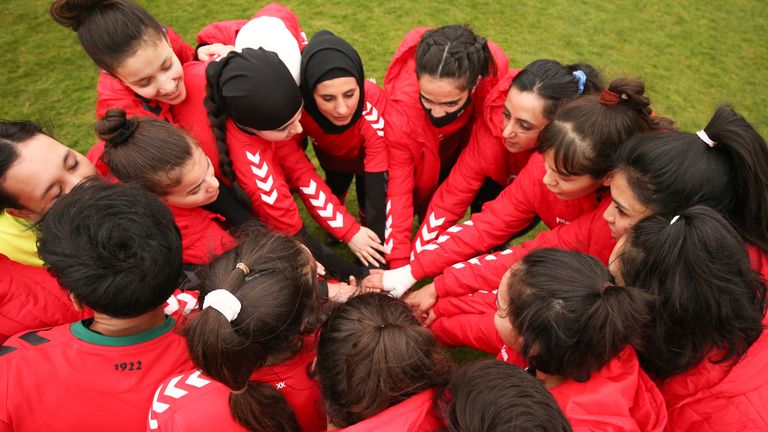
The Afghanistan women's development squad crossed the border into Pakistan, before flying to the UK and Sky Sports News was invited to interview the players after training and workshops.
The teenagers' flight was funded by celebrity Kim Kardashian, with Leeds owner Andrea Radrizzani also involved. But the main inspiration behind the planning and logistics was former Afghanistan captain Khalida Popal, who has also coached the country's youth teams.
Taliban rule not only meant the girls could not continue their football careers, but it also meant their lives were at risk if they wanted to continue the basic freedoms they had enjoyed and taken for granted. Along with team-mates and some family members, the development squad found a way to escape Afghanistan and cross into Pakistan.
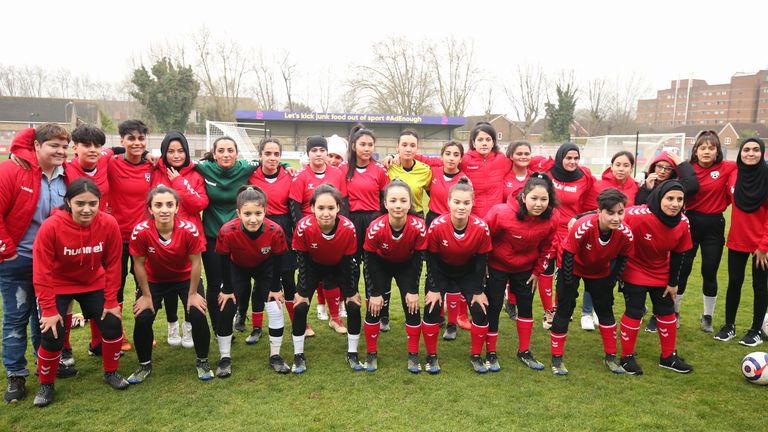
Popal was instrumental in their evacuation and safe passage to the UK. She founded the women's team in 2007 and captained the national side. She told Sky Sports News about the danger faced by the girls and their families when they decided to leave Afghanistan.
She said: "Going through borders, getting out of your home, knowing a great danger is waiting for you. You may get shot, but you still take the risk. As a young woman the age of 15, 16, 19, 20-years-old."
Popal knows what it is like to leave her country. She left Afghanistan in 2011 after receiving death threats and being assaulted by those who did not want women to play sport.
'I wish I could see my sister again'
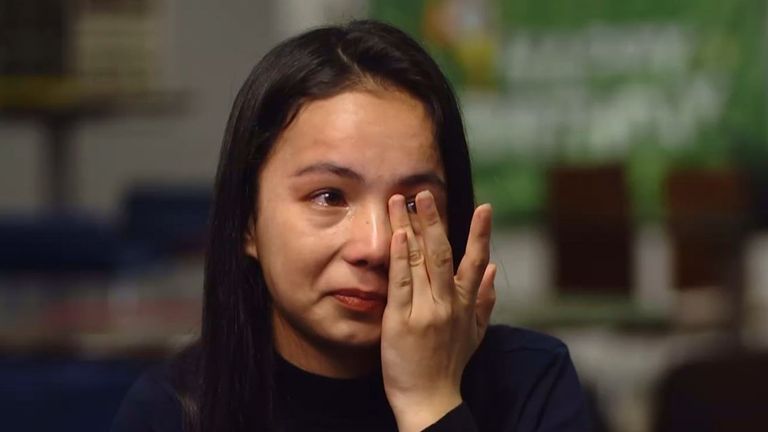
Najma, who is 19, only started playing football a few years ago. She soon loved the sport and was good enough to play in the Afghanistan women's development squad. Despite enjoying life in the UK over the last year-and-a-half, she feels the pain of being separated from her sister who is in Afghanistan.
Holding back tears, Najma said: "She wished me the best and I am wishing to see her again. That's my biggest wish for me and for my parents." Najma speaks regularly on the phone to her sister but says she does not know if they will see each other again.
"She was like the best supporter for me because every football player needs money, to do training, everything. She was like this: 'okay, I will give you, I will make the money. You just go to your training. This is important'," Najma added.
Another aspiring footballer Mahdiya explains the restrictions on freedom for young women under the Taliban.
"I think it was so hard for us because we can't do anything that we want," she said.
"Like we can't go to school. We can't go training or football. We should wear a hijab and we can't go anywhere that we want, and we should stay at home and get married."
Both Najma and Mahdiya are part of the women's youth development squad who were among hundreds of female athletes to leave Afghanistan in 2021, caught up in the chaotic withdrawal of Western forces. Many of the country's other players from the national women's football team and their youth teams went to Australia.
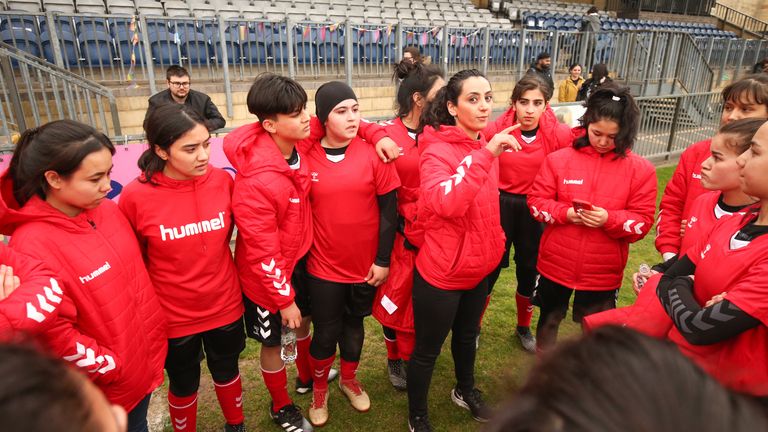
For the less experienced development squad of around 30 girls and their families, they crossed the border from Afghanistan into neighbouring Pakistan without knowing their future. The Prime Minister of Pakistan at the time, Imran Khan, helped them to enter the country before the players faced a nervous wait until their flight to the UK was confirmed in November 2021.
Mahdiya says it was a very sad time when she initially left her family and crossed the border into Pakistan. She said the girls did not know what would happen and which country would be their future home.
She described her delight at getting on the plane to the UK and has since been permanently reunited with members of her family in the UK. But she still has some family and friends in Afghanistan, where she admits she is unlikely to ever return.
"It was so good because we finally knew we were going to come to the UK. The UK is the best country. We are safe, we are free [to play] football. We can do everything.
"My parents were so happy - they say 'you can go to university and school. You can have choices and do everything you want'." Most of the girls are studying together in college and continue to train and play football regularly.
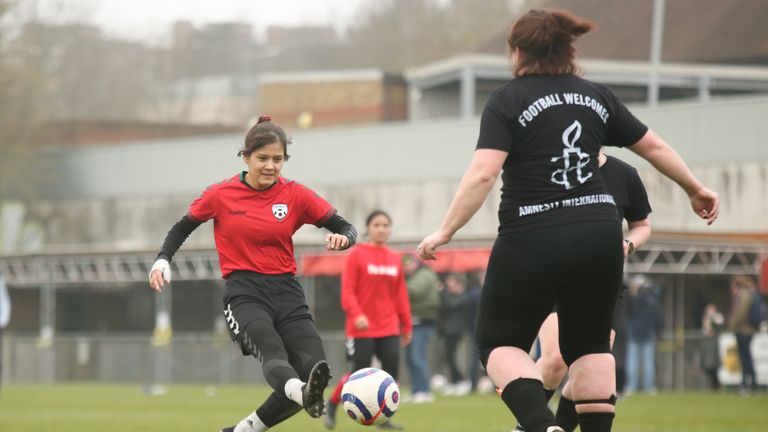
Popal said: "If people in this world contribute positively using their power. If it's media or someone who is a footballer or someone who has a club or someone who is a reality show star. Imagine if we all take responsibility in this world. This world would be a good place and a better place for everybody."
'You will be told get out of our country….'
If the girls and their families needed advice on what to expect, they had help from Popal who gave them valuable information about some reactions in the UK.
She revealed her message to the young girls: "You're safe but there are things I need to raise awareness about. You will face a group of people that will hate you. [They] will try everything possible to be against you coming to their country.
"You will maybe face some kind of words like harassment in the street or someone will call you: 'you're a refugee get out of our country, why are you here?' And that happened actually.
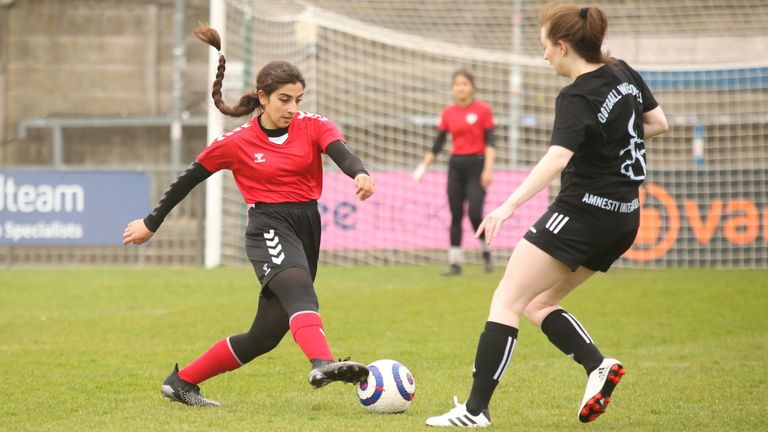
"When the first time they arrived in the UK, in the place that they are living, there was a kind of protest against them arriving in the UK and they were so surprised. They were like … 'why it's happening?',"
She added: "These young women have been through a lot. All they want is safety, but also contribute positively to society and give back to the communities that have provided a home for them."
The location of where the girls stay in the UK, go to school, train and play football is largely kept a secret, in part to avoid attracting protests, and for their own safety.
Popal says many of the girls want to play football professionally, and being in the UK allows them to fulfil their dreams. For those who do not make it, they can also become coaches or referees. Sport is a powerful tool that has shaped Popal's own life and she hopes for similar success for the young girls.
She keeps in regular contact with the players and often visits the UK to run workshops on belonging and inclusion as part of her charity Girl Power. It focuses on football and education to help ethnic minorities - especially for those who are refugees or immigrants.
However, for Najma, her biggest goal is off the pitch.
"My biggest wish is that my siblings have good futures. And we just want to have normal, just [a] normal life in the UK," she said.
Freedom, football and fun is something many around the world have taken for granted. But for these young girls, they will always value something which many of their childhood friends do not have.
And they hope to make the most of it by building a new future and achieving their potential on and off the pitch.
- 消息参考来源: SKY_SPORT
- 严禁商业机构或公司转载,违者必究;球迷转载请注明来源“懂球帝”
- 懂球帝社区规范:抵制辱骂

